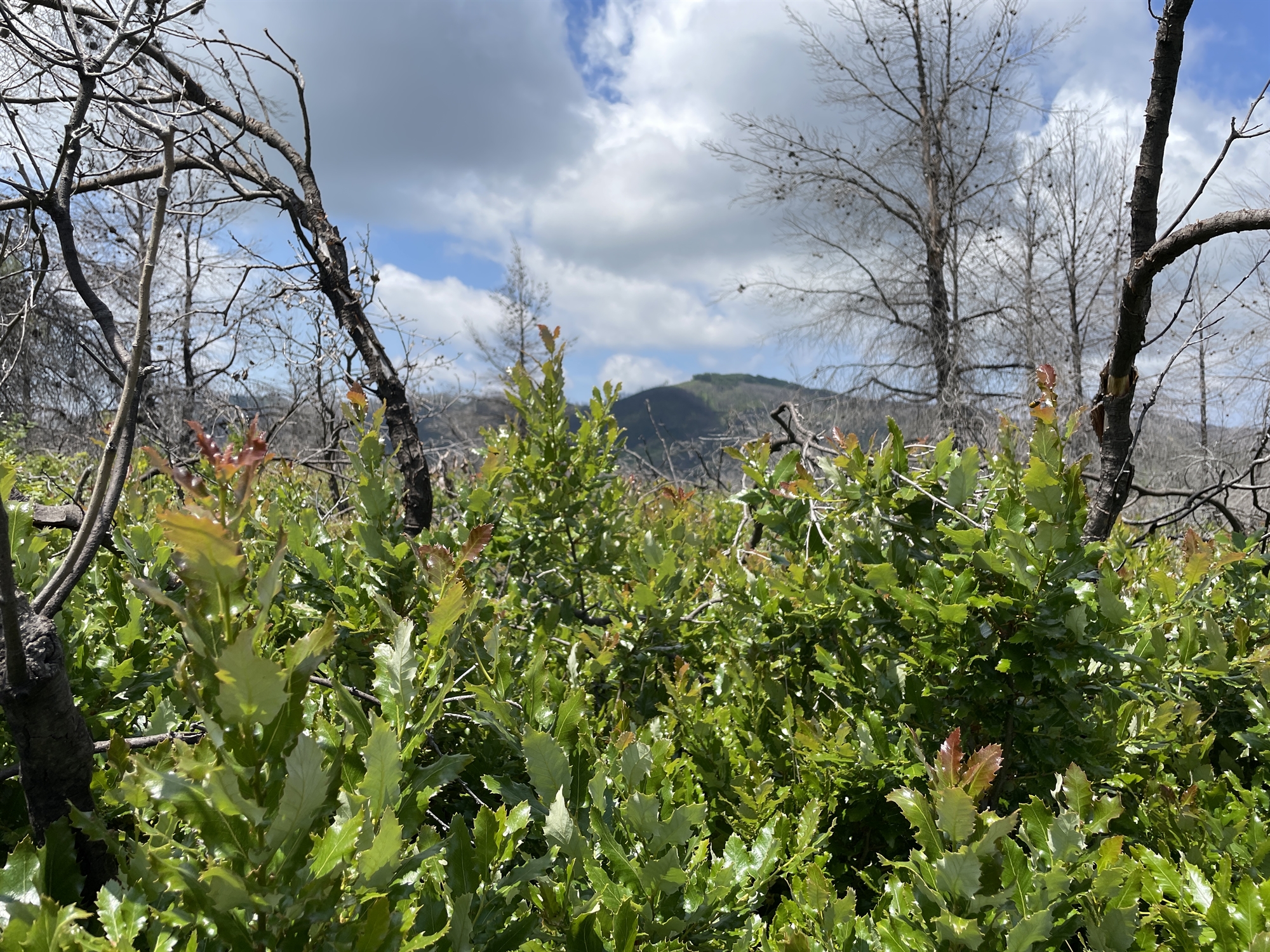
“I am a complete disaster! I think I am to blame for what happened in the north of Evia,” were the first words of Robin Lane Fox, with his insightful self-deprecating humor. a column on horticulture in the Financial Times!) a few days ago sat across from me in the living room with botanist Harriet Rix, greeting Michalis and Despina’s home in Moscow, in Kolonaki. their owners and friends have an amazing estate with organically grown walnut trees.The area was saved from fire thanks to a sudden gust of wind.A small miracle in the fiery chaos of 2021, covering an area the size of Naxos in its flames.
“In 2008,” continued Lane Fox, “I wrote a poem called Traveling Heroes, which tells of ancient Euboea and its fearless inhabitants who, in the 8th and 9th centuries, reached Syria and southern Turkey, discovering sea routes for trade and settlements. for other Greeks. They were pioneers and excelled in many areas. To complete the research, which took 25 years, I constantly visited this place and admired its incredible nature. And where are we today? Northern Evia is burned, Syria is razed to the ground as a result of the war, and the south of Turkey by an earthquake. I believe that they should forbid me to write books and, above all, that they should not invite me anywhere … ”he added.

“Magic Forests”
“I also remember Evia during that period before the disaster,” added 32-year-old Harriet. She is the daughter of the famous botanist Martin Rix, whose name was given in his honor to the new plant Fritillaria Rixii discovered in Evia by a botanist colleague. So his daughter remembered the trips she made as a child with her father to those beautiful places that turned into ashes, and began to describe the magical chestnut forests that did not survive the flames. Before me were two foreigners who spoke about our homeland with undivided love and knowledge, two philhellenes who wanted to wipe out scorched earth from the face of the earth.
But what exactly were the two Britons looking for among the thousands of charred pines and oaks? They accepted the invitation of the Mosho couple to look closely at the affected area, for which a huge plan was drawn up, but it has not yet been implemented, and it does not seem to bear fruit for the people who have lost everything. “Greek and foreign journalists were intensively engaged in this place immediately after the fire. But I, who write about trees and plants, about flora in the broadest sense, waited two years to come and see the situation, to see what was the reaction of nature itself to the disaster that preceded it. As for Harriet Ricks, a member of the Board of Trees in Britain, who has special knowledge in this area, she was the right person to accompany me on the trip,” he stressed about the young scientist who is now writing a very interesting book on the subject of trees.
“There is a visible process of regeneration, which gave hope. We are no longer in Dante’s hell,” says the optimistic British professor.
“In this book, I explain that trees cannot run, hunt, or kill. They are motionless and unarmed. But they have their own mechanisms. They can shape the environment through biochemistry. So I was very interested to know what happened after the fires of 2021,” said Ricks, who met Lane Fox through the latter’s friendship with her father. Indeed, in one weekend they saw with their own eyes how things are with 1/3 of the island. I didn’t dare ask their impressions. However, their answer surprised me. “When I first saw images of what the fire left behind, I thought that the end of the world had come, the nature that surrounded my favorite wandering heroes was destroyed. But now that I have gone there, I must tell you that there is a visible process of regeneration going on there, which gave me hope. We are no longer in Dante’s hell, but in a kind of purgatory. Of course, we saw countless burnt pines, but we also found that from the roots of old oaks, like a low green border in blackness, an endemic species of oak began to sprout.
Harriet agrees enthusiastically: “This is an amazing tree, related to the species that grows in northern Greece, and also in Troy, only smaller in Evia. It tends to quickly revive after a fire, to grow again. It’s an extremely touching sight.” And Lane Fox adds: “You see, she is a real scientist! I, who are more romantic, call me lame or poetic, believe that this tree came from ancient Troy after the war. I can imagine warriors returning from a ten-year campaign and bringing with them this sapling they planted in memory of their leader, who fell dead and was one of the first killed in the Iliad. And the twelve gods hastened to protect him to this day,” commented Lane Fox, a prominent expert on the history of Alexander the Great and who advised Oliver Stone on the Hollywood film about the recruit, even taking on an additional role. in film.
“After every fire, there is always a process of reforestation. However, the time it takes to do something like this is influenced by many factors, such as the speed and intensity of the fire, the quality of the soil. You need to look at each case separately. What we don’t understand is that the destructive fire offers us fertile soil that even directly receives the sun’s rays, since the trees no longer cast a shadow. This creates the right conditions for crops,” explains Harriet. “This is precisely the problem, not only in Evia, but throughout the world. Ecologists and foresters want exactly the same burnt forest with the same trees to be recreated. Personally, I consider this a huge mistake. In the north of Evia, I would create an exemplary botanical garden on a patch of scorched earth, also mixing crops with transplants. It also helps the residents who live in the area a lot by giving them an incentive to stay at work. Unfortunately, however, this flexibility does not exist. However, you should not single out the inhabitants from the environment. Keep one and leave the other. He wants a holistic approach.”
The lack of incentives was also commented by Michalis Moschos, who knows the area well thanks to the estate as well as through his contacts with the villagers: fire, but it dealt the final blow to the area. Before, we did not have a good road network for transport, which also manifested itself in extinguishing. The population began to thin out, agriculture weakened. When everything turned to ashes, people were left in a wasteland that needs to wait as long as 20 years to see greenery again. Think about those who were engaged in logging, resin, they had industries. How will people live? Unfortunately, the plan drawn up by the state provided for interaction with institutions, universities, but not with the communities themselves. The tenants did not have their own opinions about things that directly concern them, ”he notes in“ K ”.

the bees did it
Some of the Euboeans were more fortunate, such as beekeepers. At first there were fears that all the bees would fly away because there would be no food, since there were no more trees. Over time, however, many flowers have grown, and therefore again there is honey not from pines, but from flowers. Thus, a small part of the production was saved, but this, of course, is not enough to support the local economy. Shortly before we parted, I asked them both if they were optimistic or pessimistic about their return from northern Evia: “Forests and greenery will recover very slowly, perhaps they will return to what they once were,” Robin says. Lane Fox, adding: “I have an age too, I probably won’t see them like Harriet who is a young girl. The question is always in people, in the fact that they manage to find a new pace, find a job, manage to survive. Harriet agrees: “There is nothing more difficult than to see how what once surrounded you turned into ashes, and not know what to do. Together with pines, oaks and chestnuts, people should also bloom. This is the most difficult, because our life is finite in time, unlike forests, which are restored in the eternity of nature.”
Source: Kathimerini
Ashley Bailey is a talented author and journalist known for her writing on trending topics. Currently working at 247 news reel, she brings readers fresh perspectives on current issues. With her well-researched and thought-provoking articles, she captures the zeitgeist and stays ahead of the latest trends. Ashley’s writing is a must-read for anyone interested in staying up-to-date with the latest developments.